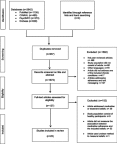The impact of personal and cultural beliefs on medication adherence of patients with chronic illnesses: a systematic review
- PMID: 31303749
- PMCID: PMC6611718
- DOI: 10.2147/PPA.S212046
The impact of personal and cultural beliefs on medication adherence of patients with chronic illnesses: a systematic review
Abstract
Background: Patients' adherence to therapeutic regimes may be influenced by subjective beliefs about chronic conditions. One of the challenges for health professionals in enhancing adherence is taking patients' understanding into account when giving health advice and/or providing medical treatment.
Purpose: This review aimed to evaluate the consequent effects of personal and cultural beliefs on medication adherence, in patients with chronic conditions such as hypertension, diabetes mellitus, chronic obstructive pulmonary disease and asthma.
Method: A systematic review methodology was used. PubMed, CINAHL, EMBASE and PsychINFO, databases were searched for relevant articles. The main terms analyzed were illness perceptions, health beliefs, cultural beliefs, chronic conditions and medication adherence.
Results: From 2,646 articles, 127 were retained for further assessment, and finally 25 met the inclusion criteria. A cross-sectional questionnaire survey research design was conducted in all included articles. Of these most (n=22) targeted hypertension or diabetes mellitus. A number of personal and cultural based factors were identified as being associated with adherence to medication regimes - 40% of articles (n=10) examined perception of illness, 20% (n=5) health literacy, 16% (n=4) cultural beliefs, 12% (n=3) self-efficacy, 16% (n=4) spiritual and religious beliefs, as well as 20% (n=5) illness knowledge. Statistically significant associations between medication adherence and these personal and cultural factors were found in 80% (n=20) of the included studies. However, the direction of associations varied between studies depending on the factor that was examined.
Conclusion: This review has evaluated the impact of personal and cultural factors on medication adherence and highlighted the gaps in literature regarding adherence. Further research is required to fully identify the associations between religious beliefs, control beliefs and illness knowledge and medication adherence.
Keywords: asthma; chronic obstructive pulmonary disease; culture; diabetes mellitus; health beliefs; hypertension; medication adherence; perception of illness.
Conflict of interest statement
The authors report no conflicts of interest in this work.
Figures
Similar articles
-
The Consequences of General Medication Beliefs Measured by the Beliefs about Medicine Questionnaire on Medication Adherence: A Systematic Review.Pharmacy (Basel). 2020 Aug 17;8(3):147. doi: 10.3390/pharmacy8030147. Pharmacy (Basel). 2020. PMID: 32824492 Free PMC article. Review.
-
Impact of Personal, Cultural and Religious Beliefs on Medication Adherence among Patients with Chronic Diseases at University Hospital in Northwest Ethiopia.Patient Prefer Adherence. 2022 Jul 27;16:1787-1803. doi: 10.2147/PPA.S370178. eCollection 2022. Patient Prefer Adherence. 2022. PMID: 35923657 Free PMC article.
-
The association of health literacy with illness perceptions, medication beliefs, and medication adherence among individuals with type 2 diabetes.Res Social Adm Pharm. 2018 Sep;14(9):824-830. doi: 10.1016/j.sapharm.2017.12.005. Epub 2017 Dec 13. Res Social Adm Pharm. 2018. PMID: 29317189
-
Effect of personal and cultural beliefs on medication adherence in the elderly.Drugs Aging. 2006;23(3):191-202. doi: 10.2165/00002512-200623030-00002. Drugs Aging. 2006. PMID: 16608375 Review.
-
Clustering medication adherence behavior based on beliefs in medicines and illness perceptions in patients taking asthma maintenance medications.Curr Med Res Opin. 2016;32(1):113-21. doi: 10.1185/03007995.2015.1105204. Epub 2015 Nov 16. Curr Med Res Opin. 2016. PMID: 26443294
Cited by
-
Modifiable and Non-modifiable Factors Associated with Low Awareness of Hypertension Treatment in Indonesia: A Cross-Sectional Population-Based National Survey.Glob Heart. 2022 Aug 16;17(1):56. doi: 10.5334/gh.1143. eCollection 2022. Glob Heart. 2022. PMID: 36051316 Free PMC article.
-
Barriers and Solutions to Improve Therapeutic Adherence from the Perspective of Primary Care and Hospital-Based Physicians.Patient Prefer Adherence. 2022 Mar 11;16:697-707. doi: 10.2147/PPA.S319084. eCollection 2022. Patient Prefer Adherence. 2022. PMID: 35300358 Free PMC article.
-
Health Literacy and Medication Adherence Among Patients with Type 2 Diabetes in Jordan: A Cross-Sectional Study.Patient Prefer Adherence. 2024 Sep 25;18:2019-2026. doi: 10.2147/PPA.S484135. eCollection 2024. Patient Prefer Adherence. 2024. PMID: 39345761 Free PMC article.
-
The Associations among Gender, Age, eHealth Literacy, Beliefs about Medicines and Medication Adherence among Elementary and Secondary School Teachers.Int J Environ Res Public Health. 2022 Jun 6;19(11):6926. doi: 10.3390/ijerph19116926. Int J Environ Res Public Health. 2022. PMID: 35682509 Free PMC article.
-
A qualitative exploration of the barriers and facilitators affecting ethnic minority patient groups when accessing medicine review services: Perspectives of healthcare professionals.Health Expect. 2022 Apr;25(2):628-638. doi: 10.1111/hex.13410. Epub 2021 Dec 23. Health Expect. 2022. PMID: 34951087 Free PMC article.
References
-
- World Health Organization. Hypertension; 2018; Available from: https://www.who.int/gho/ncd/risk_factors/blood_pressure_prevalence_text/en/. Accessed September25, 2018.
-
- World Health Organization. Diabetes; 2018; Available from: http://www.who.int/news-room/fact-sheets/detail/diabetes. Accessed September25, 2018.
Publication types
LinkOut - more resources
Full Text Sources
Miscellaneous



